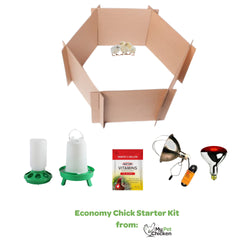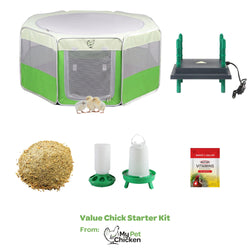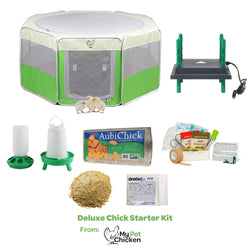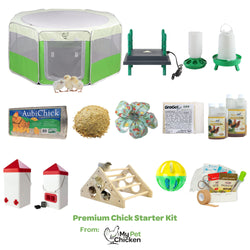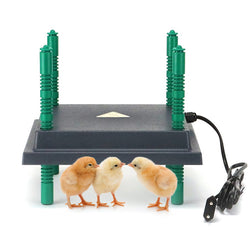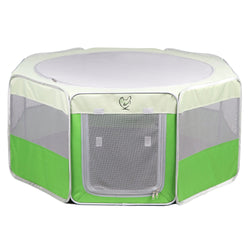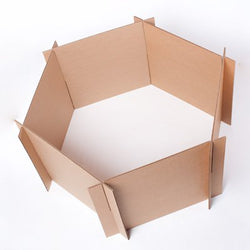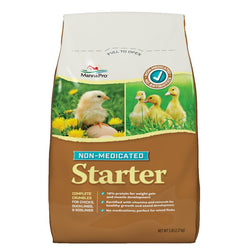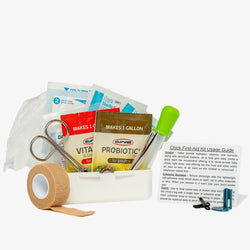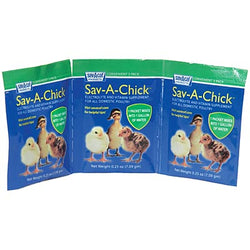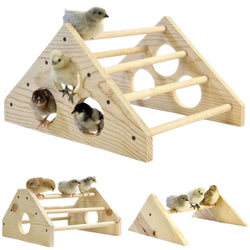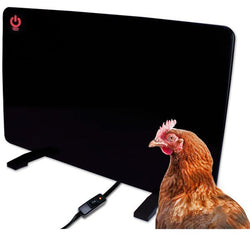How do I decide between hatching fertile eggs and buying baby chicks?
Back to blog
In almost every case, starting a laying flock with baby chicks will be easier and less expensive than starting one by hatching fertile eggs at home.
Don't get us wrong, home hatching is great! But remember that fertile eggs (supplied from any source) are not guaranteed to hatch, because shipping can be so rough on the eggs. With shipped eggs, the average hatch rate is about 50%. That's just the average, though! That means sometimes you will have higher, and sometimes lower. In fact, with eggs, it is possible to do everything right and still not have any hatch. Plus, about 50% of what hatches will be male, on average. And again, that's just the average!

When you hatch, you'll hatch roosters, too. Are you prepared for that?
I know this from personal experience. When I first got started, I decided to try with fertile eggs. I incubated 18 eggs with the hope of four females or so at the end. My math was: 9 or so will hatch, half or so of those will be female, so I should end up with four or five hens, right? Three at the least, odds are. That's basic math.
In reality, though, here's what happened: eight out of 18 hatched, not bad. Close to average. I could still expect three or four females, so I thought. But as it turned out, seven out of the eight ended up being males! And one hen does not make a good laying flock, believe me!
I had thought I would save money by getting hatching eggs. After all, they are less expensive to ship, and eggs were also less expensive than chicks, per each. So, I would pay about $65 for the eggs, when to order 25 hens of my breed (25 was the minimum number before My Pet Chicken was around), would have been more than $100. Clearly I would save about $40 starting with eggs. But I hadn't considered everything.
What I failed to consider was that if I started with chicks, I would be virtually guaranteed to have my female chicks at the end--that, or I would at least get a refund for my trouble. I could even pretty easily rehome or even sell my extra baby hens. With eggs, though, I wasn't guaranteed anything--I wasn't guaranteed they would hatch, much less how many females I would end up with. Plus, rehoming any extra males I might hatch would be much more difficult than rehoming extra hens.
And in the end, I hatched just one hen. I can also tell you that realizing that I paid $65 for the one hen was not fun. I had been penny shy and pound foolish--again. Why do I do that to myself?
Believe me, we really sympathize when we hear back from people with poor hatching results, but seeing those results every so often is just the nature of the hatching beast. I was smart and went in with the right idea, that on average, I was likely to get the four hens I wanted. But "average" means just that: AVERAGE. It's no guarantee. I suppose that somewhere out there, to balance my 87% male results out, was some happy person who hatched 87% females, and was doing a little jig of glee at the end of a rainbow. But knowing that will be cold comfort if you are the one on the wrong end of the average!
So, don't make the mistake I did. If you are a beginner and you are wanting to get started with a laying flock, almost every time it's better to start with baby chicks rather than fertile eggs. Buying fertile eggs is appropriate when, for example, you are looking for a rare breed or color that you just can't find as a baby chick, when you are hoping to have several good roosters to choose from for your home flock, or when you want the experience of hatching eggs, whether in your home incubator or under a favorite broody. And even then, you'll have to be mentally prepared to get a result like I did: one hen--or possibly none!--for all the effort and expense.
Only order hatching eggs if you are prepared to be very flexible with whatever your results may be.
Don't get us wrong, home hatching is great! But remember that fertile eggs (supplied from any source) are not guaranteed to hatch, because shipping can be so rough on the eggs. With shipped eggs, the average hatch rate is about 50%. That's just the average, though! That means sometimes you will have higher, and sometimes lower. In fact, with eggs, it is possible to do everything right and still not have any hatch. Plus, about 50% of what hatches will be male, on average. And again, that's just the average!

When you hatch, you'll hatch roosters, too. Are you prepared for that?
I know this from personal experience. When I first got started, I decided to try with fertile eggs. I incubated 18 eggs with the hope of four females or so at the end. My math was: 9 or so will hatch, half or so of those will be female, so I should end up with four or five hens, right? Three at the least, odds are. That's basic math.
In reality, though, here's what happened: eight out of 18 hatched, not bad. Close to average. I could still expect three or four females, so I thought. But as it turned out, seven out of the eight ended up being males! And one hen does not make a good laying flock, believe me!
I had thought I would save money by getting hatching eggs. After all, they are less expensive to ship, and eggs were also less expensive than chicks, per each. So, I would pay about $65 for the eggs, when to order 25 hens of my breed (25 was the minimum number before My Pet Chicken was around), would have been more than $100. Clearly I would save about $40 starting with eggs. But I hadn't considered everything.
What I failed to consider was that if I started with chicks, I would be virtually guaranteed to have my female chicks at the end--that, or I would at least get a refund for my trouble. I could even pretty easily rehome or even sell my extra baby hens. With eggs, though, I wasn't guaranteed anything--I wasn't guaranteed they would hatch, much less how many females I would end up with. Plus, rehoming any extra males I might hatch would be much more difficult than rehoming extra hens.
And in the end, I hatched just one hen. I can also tell you that realizing that I paid $65 for the one hen was not fun. I had been penny shy and pound foolish--again. Why do I do that to myself?
Believe me, we really sympathize when we hear back from people with poor hatching results, but seeing those results every so often is just the nature of the hatching beast. I was smart and went in with the right idea, that on average, I was likely to get the four hens I wanted. But "average" means just that: AVERAGE. It's no guarantee. I suppose that somewhere out there, to balance my 87% male results out, was some happy person who hatched 87% females, and was doing a little jig of glee at the end of a rainbow. But knowing that will be cold comfort if you are the one on the wrong end of the average!
So, don't make the mistake I did. If you are a beginner and you are wanting to get started with a laying flock, almost every time it's better to start with baby chicks rather than fertile eggs. Buying fertile eggs is appropriate when, for example, you are looking for a rare breed or color that you just can't find as a baby chick, when you are hoping to have several good roosters to choose from for your home flock, or when you want the experience of hatching eggs, whether in your home incubator or under a favorite broody. And even then, you'll have to be mentally prepared to get a result like I did: one hen--or possibly none!--for all the effort and expense.
Only order hatching eggs if you are prepared to be very flexible with whatever your results may be.
